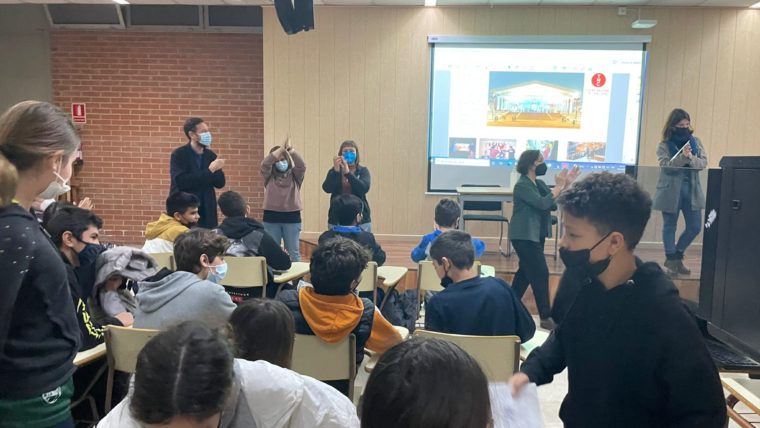New educational itinerary 'Art-Science-Nature-Sustainability'

What role should our species, the human species, play in maintaining the biodiversity of ecosystems? This is the challenge faced by first-year ESO students at the Escola Arts secondary school in the pilot test of the Art-Science-Nature-Sustainability (ACNS) itinerary. The initiative has been promoted by the working group Vincles x l’Acció Educativa, of the Pedagogical Innovation Council of the Institute of Culture of Barcelona, and has had the participation of five entities, as well as Barcelona Science and Universities of Barcelona City Council since its inception. The itinerary makes a transdisciplinary educational proposal centred on art and science. The results of the first pilot test open the door to a wider implementation of the itinerary in the next academic year.
The central theme of the itinerary of this pilot test was biodiversity and its importance in ecosystems. The proposal was structured around a pre-school presentation for pupils and teachers, and three morning sessions in different facilities related to biodiversity and artistic creation: Barcelona Zoo, the Centre for the Recovery of Marine Animals (CRAM) and the National Theatre of Catalonia (TNC). These visits have also been worked on with the Barcelona Biomedical Research Park (PRBB) and Anèl·lides, marine environmental services.
The starting question of this itinerary is the role of our species in the conservation of biodiversity. Throughout the itinerary, the students had to reflect on questions such as whether we should be the ones to save endangered species or whether we should let natural selection do the job. To help with this reflection, students were shown different points of view that helped them to empathise with a repertoire of situations through participatory dynamics and co-creation work in which students and teachers played a key role.
The sessions
The first session, held at the Barcelona Zoo, with the participation of the Institute of Evolutionary Biology, research center of the PRBB, the first year ESO students from the Escola Arts secondary school in the Hostafrancs district of Sants-Montjuïc, tackled the subject of terrestrial biodiversity with a dynamic based on empathy in which they had to put themselves in the shoes of other people or beings. The second session took place at CRAM, in El Prat de Llobregat, and focused on aquatic biodiversity, with a dynamic on changing perspective led by Anèl·lides. Finally, the third session, at the TNC, aimed to develop a communicative product that would allow the knowledge acquired in the previous sessions to be put into action.
With all this, the itinerary aims to broaden the students’ experiences in terms of science, social commitment, critical spirit, teamwork, research and communication, among other skills. Specifically, the itinerary incorporates basic competences in the scientific-technological, artistic, cultural and values, and personal and social fields, which are integrated transversally in all the sessions. So much so that the itinerary itself lacked a title, and it was up to the pupils to name it according to their experience during the sessions.
Results
The pilot test was carried out between March and May this year. As a final result of the process, the students, divided into several working groups, prepared theatrical fragments that addressed the knowledge acquired and what the experience suggested to them, putting into practice the relationship between art and science through artistic and scientific languages. Likewise, after a few days of thinking, the students of the Institut Escola Arts proposed the title of the itinerary Invasive, are they the evil ones?, which is indicative of the work of empathy and the search for solutions taking into account all the parts of a real problem facing the biodiversity of the planet today: that of invasive species.
In general, the experience has been very encouraging, both for the students and teachers of the Institut Escola Arts, as well as for the team behind the initiative, which has been able to identify areas for improvement in the practice of the itinerary and has been able to make some adjustments for the implementation of the project in the next school year.




